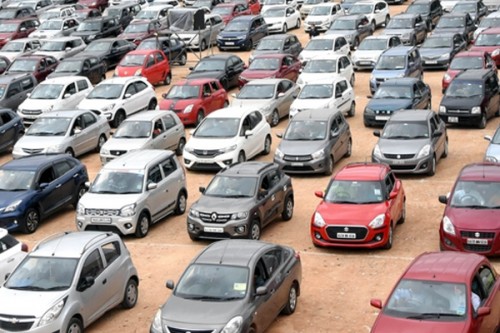Inventory levels of passenger vehicles at alarming levels, exceeding 60-day supply first time

New Delhi, Sep 5 (IANS) It is alarming that inventory levels of passenger vehicles have exceeded a 60-day supply for the first time, even before the onset of the Navratri-Diwali festivities -- a trend that necessitates vigilant monitoring by PV OEMs, says The Federation of Automobile Dealers Associations (FADA) President, Manish Raj Singhania.
The Federation of Automobile Dealers Associations (FADA) on Tuesday released Vehicle Retail Data for August.
In the passenger vehicles arena, improved vehicle supply, bolstered by expanded customer schemes, has maintained positive market dynamics. Despite such advances, supply chain bottlenecks persist, particularly in timely deliveries. The market has responded favourably to the introduction of new hybrid and CNG models; however, a constrained product range in popular segments, such as mid-size SUVs, continues to limit overall potential, FADA said.
Notably, three-wheeler sales reached a historic high in August, registering 99,907 units -- a YoY increase of 66 per cent and a MoM surge of 6 per cent, thereby eclipsing July 2023's record of 94,148 units.
As the Indian Automobile Industry enters September, the outlook remains cautiously optimistic, shaped by a multitude of factors that vary across vehicle segments. The onset of the festive season, beginning with Onam, has uplifted market mood, improved liquidity and eased earlier bottlenecks in the supply chain across all categories, FADA said.
In the two-wheeler market, while a broader range of models is now available, subdued rural demand due to insufficient rainfall could temper sales growth. For CVs, although bulk deals and the favourable timing of the construction season in September add to the optimism, the real sales momentum is anticipated to pick up during the Navratri and Deepawali festival following the Shraadh period.
The PV market, meanwhile, offers a mixed bag: new product launches and better stock availability are positive signs, but high customer discount expectations and the impact of the 'Shraadh' period may act as small speed breakers, FADA said.
After a prolonged period of stagnation, rural demand is showing signs of a positive resurgence. However, this recovery remains tenuous, contingent on the performance of the final phase of the monsoon season.
Lack of sufficient rainfall could precipitate a rise in inflation, adversely affecting consumer purchasing power and diminishing demand. This meteorological shortfall would not only jeopardize the yield of the ongoing kharif crops but also cast a shadow on the subsequent sowing season for rabi crops. Such developments would be particularly inopportune as they would coincide with the peak of India's festive season, notably Navratri and Deepawali, traditionally periods of heightened consumer activity, FADA said.

|

|

